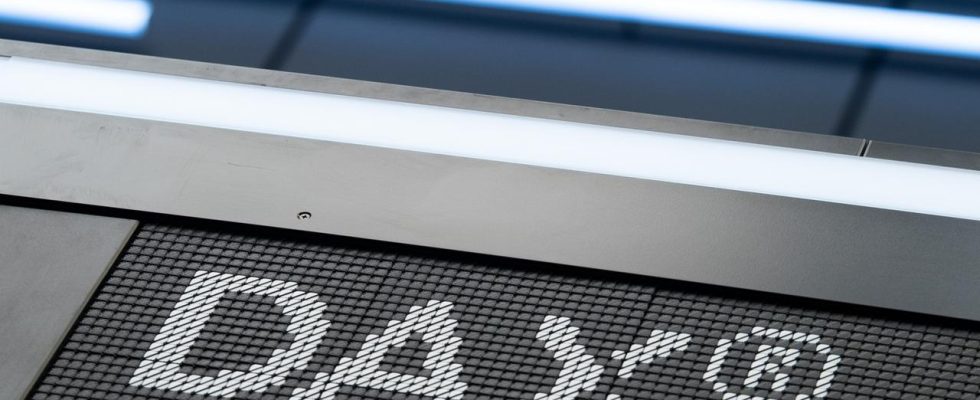market report
Fears of an expansion of the war between Hamas and Israel continue to keep the stock market in its grip. Yesterday’s price losses in the DAX are likely to extend today.
The DAX could fall below the psychologically important mark of 15,000 points again today. Before the Xetra launch, the broker IG valued the German leading index 0.7 percent lower at 14,995 points. The previous monthly low is 14,948 points. If it falls below this level, it would again be the lowest level since the end of March. “Sentiment is bad everywhere,” said market analyst Stephen Innes of SPI Asset Management.
Yesterday the DAX fell by one percent to 15,094 points. Investors feared that the explosion at a hospital in Gaza City, potentially killing hundreds, would complicate efforts to contain the escalating conflict. “The risks would not decrease on the Frankfurt trading floor,” commented Konstantin Oldenburger, analyst at broker CMC Markets. “Long-term investors in particular are very concerned about the events in the Middle East.”
Geopolitical concerns are also weighing on prices on Wall Street. The leading index, the Dow Jones, fell by one percent to 33,665 points yesterday, after having managed to stay in the black on Tuesday. The market-wide S&P 500 fell by 1.3 percent to 4314.60 points in the middle of the week. The technology-heavy Nasdaq 100 lost 1.41 percent to 14,909 points, noticeably extending its losses from the previous day.
It’s a similar story in Asia today: Asian stock markets are cautious as traders adjust their expectations for a lower probability of interest rate cuts, rising long-term yields and increasing geopolitical uncertainties, said Anderson Alves of ActivTrades.
The Nikkei index, which includes 225 values, lost 1.9 percent to 31,447 points. The broader Topix index fell 1.5 percent to 2,262 points. The Shanghai stock exchange lost 1.2 percent. The index of major companies in Shanghai and Shenzhen lost 1.6 percent.
The South Korean car manufacturers Hyundai and Kia are stocking up on semiconductors from the German chip manufacturer Infineon. Infineon said the companies had signed a multi-year supply agreement. Infineon will build and maintain manufacturing capacities to supply Hyundai/Kia with power semiconductors made of silicon carbide (SiC) and silicon (Si) by 2030. The South Koreans will contribute financially. Infineon did not comment on the volume of the agreement.
Despite renewed growth, SAP’s quarterly results partially missed market expectations. SAP announced an increase in revenue from its promising cloud business by 23 percent, adjusted for currency effects, to 3.472 billion euros. According to forecasts compiled by data provider Visible Alpha on behalf of the company, analysts had expected 3.525 billion euros.
Group sales increased by nine percent and were in line with market expectations at 7.744 billion euros. The adjusted operating profit, which increased by 16 percent, exceeded the forecast of 2.194 billion euros at 2.278 billion euros.
The US electric car manufacturer Tesla is feeling the effects of the self-initiated price war. The profit margin fell to 17.9 percent in the third quarter, the company announced. In the same quarter of the previous year – before the price cuts – it was 25.1 percent, and in the previous quarter it was 18.2 percent. Sales rose nine percent to $23.35 billion, less than analysts’ forecast of $24.1 billion.
The crackdown on access data sharing and the cheaper subscription with ads are bringing many new customers to Netflix. The number of subscribers increased by 8.76 million in the last quarter. That was significantly better than the almost six million that Netflix itself had expected. The video streaming giant now feels so strongly encouraged in its strategy that some subscription variants will initially become more expensive for customers in the USA, France and Great Britain. The shares temporarily jumped by more than twelve percent in after-hours trading yesterday.
The driverless robotaxis from GM subsidiary Cruise are scheduled to hit the streets in Tokyo in 2026. GM is working with the Japanese car company Honda to achieve this, as the companies announced. Honda co-developed the self-driving “Origin” vehicles, which will soon be used in Cruise’s robotaxi service in the USA. The cars have neither steering wheel nor pedals. Initially, 500 “Origin” vehicles are to be built in the USA for Tokyo.
The Swiss food company Nestle had less sales in the first nine months of the current year than in the same period last year. The high Swiss franc put a damper on the company’s plans. Sales fell by 0.4 percent to 68.8 billion francs (72.5 billion euros). The strong franc reduced sales by 7.4 percent.

